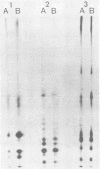Abstract
The polypeptide coding assignments for six of the respiratory syncytial virus-specific mRNAs were determined by translation of the individual mRNAs in vitro. The coding assignments of the RNAs are as follows. RNA band 1 is complex and can be separated into at least two components on the basis of electrophoretic mobility (molecular weights [MWs] approximately equal to 0.21 X 10(6) and 0.31 X 10(6), respectively) that code for three polypeptides of 9.5, 11, and 14 kilodaltons (K). RNA 2 (MW, 0.39 X 10(6)) codes for a 34K polypeptide; RNA 3 (MW, 0.40 X 10(6)) codes for a 26K polypeptide; RNA 4 (MW, 0.47 X 10(6)) codes for a 42K polypeptide; and RNA 5 (MW, 0.74 X 10(6)) codes for a 59K polypeptide. By limited-digest peptide mapping, the 34, 26, and 42K polypeptides synthesized in vitro appeared to be unique. Additionally, peptide mapping showed that the 34, 26, and 42K polypeptides synthesized in vitro were indistinguishable from their counterparts synthesized in infected cells. Thus, the 34, 26, and 42K polypeptides coded for by mRNAs 2, 3, and 4, respectively, were identified as the respiratory syncytial virus phosphoprotein (34K), matrix protein (26K), and nucleocapsid protein (42K), respectively. RNA 5 was shown to code for a 59K polypeptide. The 59K polypeptide synthesized in vitro did not comigrate with any polypeptide specific to infected cells, suggesting that it is a candidate for co- or post-translational modification.
Full text
PDF





Images in this article
Selected References
These references are in PubMed. This may not be the complete list of references from this article.
- Bernstein J. M., Hruska J. F. Respiratory syncytial virus proteins: identification by immunoprecipitation. J Virol. 1981 Apr;38(1):278–285. doi: 10.1128/jvi.38.1.278-285.1981. [DOI] [PMC free article] [PubMed] [Google Scholar]
- Cash P., Pringle C. R., Preston C. M. The polypeptides of human respiratory syncytial virus: products of cell-free protein synthesis and post-translational modifications. Virology. 1979 Jan 30;92(2):375–384. doi: 10.1016/0042-6822(79)90142-9. [DOI] [PubMed] [Google Scholar]
- Cash P., Wunner W. H., Pringle C. R. A comparison of the polypeptides of human and bovine respiratory syncytial viruses and murine pneumonia virus. Virology. 1977 Oct 15;82(2):369–379. doi: 10.1016/0042-6822(77)90012-5. [DOI] [PubMed] [Google Scholar]
- Cleveland D. W., Fischer S. G., Kirschner M. W., Laemmli U. K. Peptide mapping by limited proteolysis in sodium dodecyl sulfate and analysis by gel electrophoresis. J Biol Chem. 1977 Feb 10;252(3):1102–1106. [PubMed] [Google Scholar]
- Clinton G. M., Burge B. W., Huang A. S. Phosphoproteins of vesicular stomatitis virus: identity and interconversion of phosphorylated forms. Virology. 1979 Nov;99(1):84–94. doi: 10.1016/0042-6822(79)90039-4. [DOI] [PubMed] [Google Scholar]
- Davis N. L., Wertz G. W. Synthesis of vesicular stomatitis virus negative-strand RNA in vitro: dependence on viral protein synthesis. J Virol. 1982 Mar;41(3):821–832. doi: 10.1128/jvi.41.3.821-832.1982. [DOI] [PMC free article] [PubMed] [Google Scholar]
- Dubovi E. J. Analysis of proteins synthesized in respiratory syncytial virus-infected cells. J Virol. 1982 May;42(2):372–378. doi: 10.1128/jvi.42.2.372-378.1982. [DOI] [PMC free article] [PubMed] [Google Scholar]
- Fernie B. F., Gerin J. L. Immunochemical identification of viral and nonviral proteins of the respiratory syncytial virus virion. Infect Immun. 1982 Jul;37(1):243–249. doi: 10.1128/iai.37.1.243-249.1982. [DOI] [PMC free article] [PubMed] [Google Scholar]
- Hodes D. S., Schauf V., Chanock R. M. Isolation of RNA species from HeLa cells infected with respiratory syncytial virus. Proc Soc Exp Biol Med. 1974 May;146(1):287–290. doi: 10.3181/00379727-146-38089. [DOI] [PubMed] [Google Scholar]
- Huang Y. T., Wertz G. W. The genome of respiratory syncytial virus is a negative-stranded RNA that codes for at least seven mRNA species. J Virol. 1982 Jul;43(1):150–157. doi: 10.1128/jvi.43.1.150-157.1982. [DOI] [PMC free article] [PubMed] [Google Scholar]
- Laemmli U. K. Cleavage of structural proteins during the assembly of the head of bacteriophage T4. Nature. 1970 Aug 15;227(5259):680–685. doi: 10.1038/227680a0. [DOI] [PubMed] [Google Scholar]
- Lambert D. M., Pons M. W., Mbuy G. N., Dorsch-Hasler K. Nucleic acids of respiratory syncytial virus. J Virol. 1980 Dec;36(3):837–846. doi: 10.1128/jvi.36.3.837-846.1980. [DOI] [PMC free article] [PubMed] [Google Scholar]
- Levine S. Polypeptides of respiratory syncytial virus. J Virol. 1977 Jan;21(1):427–431. doi: 10.1128/jvi.21.1.427-431.1977. [DOI] [PMC free article] [PubMed] [Google Scholar]
- Peeples M., Levine S. Respiratory syncytial virus polypeptides: their location in the virion. Virology. 1979 May;95(1):137–145. doi: 10.1016/0042-6822(79)90408-2. [DOI] [PubMed] [Google Scholar]
- Pringle C. R., Shirodaria P. V., Gimenez H. B., Levine S. Antigen and polypeptide synthesis by temperature-sensitive mutants of respiratory syncytial virus. J Gen Virol. 1981 May;54(Pt 1):173–183. doi: 10.1099/0022-1317-54-1-173. [DOI] [PubMed] [Google Scholar]
- Wertz G. W., Davis N. L., Edgell M. H. High-resolution preparative gel electrophoresis: separation and recovery of functional messenger RNA species. Anal Biochem. 1980 Jul 15;106(1):148–155. doi: 10.1016/0003-2697(80)90130-x. [DOI] [PubMed] [Google Scholar]
- Wertz G. W., Davis N. L. RNase III cleaves vesicular stomatitis virus genome-length RNAs but fails to cleave viral mRNA's. J Virol. 1979 Apr;30(1):108–115. doi: 10.1128/jvi.30.1.108-115.1979. [DOI] [PMC free article] [PubMed] [Google Scholar]
- Wunner W. H., Pringle C. R. Respiratory syncytial virus proteins. Virology. 1976 Aug;73(1):228–243. doi: 10.1016/0042-6822(76)90077-5. [DOI] [PubMed] [Google Scholar]





